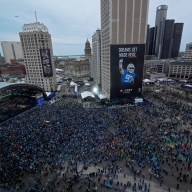From the Wild, Wild West to the Great White North: a wealth of material from legendary rappers Tupac Shakur, Dr. Dre and Snoop Dogg is now the property of a Canadian company.
Toronto-based WIDEawake Entertainment Group purchased infamous rap label Death Row from an L.A. auction for US$18 million last week.
Now, a company with fewer than 30 employees faces the monumental task of handling a staggering back catalogue that has already sold tens of millions of albums.
“The logistics of all this are a little maddening,” said CEO Lara Lavi.
Indeed, the acquisition is huge – and surprising – for a relatively unknown company that was bidding against a group that reportedly included Warner Music Group.
WIDEawake now owns every scrap that was Death Row, “aside from some of (label founder) Suge Knight’s personal paraphernalia,” Lavi said.
She said that includes the entire intellectual property, assets, contracts, music, back catalogue, unreleased catalogue and artwork for the label that released such blockbusters as Dr. Dre’s “The Chronic,” Snoop Dogg’s “Doggystyle” and Shakur’s “All Eyez on Me.”
Shakur, who was shot to death in 1996, was famously prolific and a steady stream of his unreleased work has surfaced since his death. Still, Lavi says there’s considerably more in the archives.
“There’s actually way more stuff that’s never gone to the public than (what’s out there),” she said.
But she asserts that the posthumous cash-ins that have been dribbling out steadily since Shakur’s death are a thing of the past.
“I want to make sure that whatever we do is good for the Death Row artists,” she said. “I want to see this Death Row brand go back to being about the artists who created its sound. And step away from the tabloid elements of its prior management.”
Of course, she’s referring to the sordid drama and in-fighting that eventually sunk the label.
Knight has always been an imposing figure in hip-hop. One urban legend holds that he coerced Vanilla Ice to sign over royalties from “Ice Ice Baby” by dangling the rapper off the balcony of a high-rise.
A series of massive hit records saw the label soar through the first half of the ’90s. But Death Row’s fortunes began to turn when Dr. Dre left the label in 1995 and Shakur died.
In 2006, the label filed for bankruptcy, unable to pay a $107-million settlement awarded in 2005 to Lydia Harris, who claimed to have helped found Death Row with Knight.
Lavi said she was surprised at the property’s discount price tag.
“You know, you go into these things and you don’t know to what degree the other parties are interested or not,” she said. “I assumed, probably incorrectly, that Warner would be more aggressive.
“They didn’t attempt to outbid us. I guess that’s sort of a reflection of where the market is right now.”
It could end up being a major coup for WIDEawake, which was founded in 2006. Lavi, who is American, says the company also has an office in L.A. and hopes to soon open another in London.
Now, Lavi has a few pressing tasks to address. WIDEawake is distributed by Universal in Canada but has no distribution deal in the U.S., though Lavi says the company has several offers on the table that it’s sorting through.
The company’s other priority is Canadian soul singer Sean Jones, who begins a national tour with Divine Brown on Monday.
Even as the company grows, Lavi says the focus remains on music. The 48-year-old has been involved in the business since she was a little girl, boasting a long list of credits.
She performed with Charles Neville in a ’90s group called the SongCatchers, which had a major-label record deal and toured with Peter Gabriel. She also worked solo as a singer/songwriter and is currently working on an album of lullabies.
“There may be some eyebrow raising as to how a nice Jewish soccer mom/entertainment lawyer/singer-songwriter chick ended up in this position, but I have a very long history working in the music industry with every type of musician there is,” she said. “We want to assure fans of Death Row this isn’t an army of bean counters and lawyers taking over.
“The people that are taking over have been involved in the rap movement since it began. Don’t be deceived by the soccer mom answering the questions.”
She says the future of Death Row might not lie strictly in regurgitating past hits and filtering unreleased material through to the masses, but also potentially in signing new acts.
“I think eventually what we’re going to do is create a division that takes us into the future,” she said. “Similar to how Motown started with its core artists, and then it had a period of time where it was a legacy label, then it branched out into new signings as well as maintaining its legacy catalogue.”
And she’s still looking for opportunities to expand the company’s reach.
“I sort of go through the shopping aisles of life with my cart and I just sort of pull things off the shelf that look good,” she said. “And I think I’ll do that until my cart is completely overflowed. And then I guess I’ll go to the checkout line.”
















